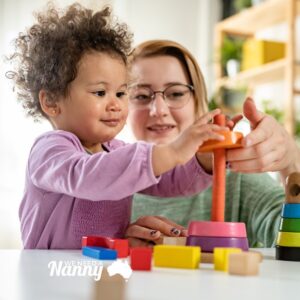There is an ongoing discussion surrounding the ideal form of child care. However, for many parents, hiring a nanny emerges as the most practical solution. So when embarking on a search for a nanny, many parents have two primary worries. The first is the possibility that their child may not bond well with a nanny and the second unexpected concern is whether the child will become more attached to the nanny than to their parents.
This duality of emotions can create a complex dynamic for the families of working parents who are already navigating the challenges of balancing their professional lives with their responsibilities at home.
Most parents naturally desire their child to form a strong bond with their caregiver or nanny, who will be a significant presence in their child’s life. However, they also fear being overshadowed by the child’s affection toward the nanny. The situation often leads to feelings of jealousy, particularly for first-time parents who are already dealing with the emotional roller coaster of returning to work.
If you find yourself in the same position, where you might fear your child bonding too much with a nanny or not wanting to bond at all with a nanny, there are methods to handle this situation and your feelings in a constructive way.
What are the Benefits of a Child Bonding with a Nanny or Caregiver
Having the presence of a nanny could easily feel like having an additional family member. Keep in mind a nanny or a caregiver spends a significant amount of time with your children in their home, which will often lead to a strong attachment. Such a relationship could be incredibly nurturing and foster a keen sense of connection that promotes feelings of safety and tranquillity for your children. Babies, especially when surrounded by familiar faces, tend to feel more secure, which enhances their ability to bond effectively.
So let’s have a look at a few examples of the many benefits for your children to have a good bond with their nanny:
A Reliable Routine
It is always vital to establish a reliable routine for children’s emotional and physical growth. A more stable environment with routine helps them to cultivate meaningful relationships. This is because it minimises the stress of constant change. The predictability helps children to know what to expect for their day-to-day activities, which in turn boosts their confidence. Thus, over time, they learn to navigate their surroundings with greater ease, because they know what is coming next in their routine.
A Structured Schedule for Child Development
Having a nanny in the house often means that children can adhere to a more structured schedule. This consistency is crucial for their overall development because it helps them understand what to anticipate throughout the day. When children are more aware of their routines; they are better equipped to thrive and grow, because they can focus on learning and exploring their new environment with less anxiety or unpredictability.
A More Comfortable Environment
Because the nanny provides a more comfortable atmosphere, it allows children to feel comfortable in their own homes. The familiar setting of their own home filled with their personal belongings creates a sense of security that is essential for their emotional well-being. The home environment can be a source of comfort that helps to nurture children with secure attachments, improving their emotional health.
Personalised Care
The one-on-one time with a nanny allows for focusing the attention and resources on your child. The dedicated interaction is invaluable to fostering strong bonds and significantly contributes to the child’s development. The personalised attention that they receive will enhance their learning experiences and emotional growth, making it a beneficial arrangement for both a child and the nanny.
Does Having a Nanny Affect Your Parent-Child Bond?
A nanny’s role is often misunderstood and underestimated. Nannies and caregivers do not just provide basic care but also take part in educational activities, emotional support and fostering a safe and nurturing environment for your child. Their responsibilities are extensive, which often results in the forming of a close familiar bond with the child.
In understanding the role of a nanny, it is important to recognise that they are not a replacement for the parent but rather an addition to the child’s circle of care. Their presence allows parents the flexibility to manage work and personal commitments while ensuring their child receives amazing support and care.
The Impact of a Nanny on Parent-Child Relationships

The effect of a nanny or caregiver on a child varies to a great extent due to various factors, which include the number of hours spent with the nanny, one’s approach to taking care of the children, and family dynamics. Children can develop strong, loving connections with multiple caregivers without diminishing their bond with their parents. Indeed, often having a nanny gives a lift to the relationship between the child and their parents.
What is a Nanny Bond
A ‘nanny bond’ refers to the attachment a nanny shares with the children being cared for based on trust, consistency, and affection. This close bonding provides the security and emotional support necessary for the development of a child. Always keep in mind that this bond supplements, rather than replaces, the love of the biological parents; it is there as an added security for the child. A nurturing nanny bond can contribute so much to the social and emotional well-being of a child, and such experiences form an important part of their overall support system.
Will Having a Nanny or Caregiver Affect Your Bond with Your Child?
Employing a nanny doesn’t change the relationship a parent has with the child. When parents and grandparents are involved, listening, and attending to the needs of the child, they can develop and even improve bonding time with their child, regardless of the hours the child spends with a nanny.
Parents and nannies can work together to provide support to the child by giving them security and well-being. This means that along with effective communication, expectations have to be clear, and active involvement in the child’s life is important. After all, parents can rest assured that a skilled nanny will have a positive effect on the life of their child without compromising this very special connection between a parent and their child.
Tips to Help Your Child Bond with the Nanny
Setting a strong bond between your child and the nanny is very critical to a child’s growth in terms of their emotional and social development. Attachment gives a sense of security coupled with stability. A good attachment builds trust and comfort in children to help them thrive while making the nannies feel valued and involved with the family to increase their dedication to quality care.

Be Positive and Show Excitement
This can differ dramatically based on your attitude toward the nanny. Talking positively and excitedly about having the nanny in your home will encourage your child towards the same feelings. Speak respectfully about the nanny, and share your excitement with your child about the new experiences they will enjoy with the nanny. Such a positive approach from the very beginning helps to create a joyful relationship with reassurance in the mind of the child that the nanny is an enjoyable and trustworthy part of their life and encourages bonding well.
Include the Nanny and Spend Quality Time
A nanny can help in the bonding process if you incorporate them into your family. By talking to your nanny and engaging them in various activities and when celebrating special occasions, you are enabling them to understand your family values and structure. This enables your nanny to care for your child consistently with your parenting style. This will also subliminally let the child know that the nanny is very close, a person to be respected and loved, and will therefore make them feel comfortable and familiar with them.
Reduce Some of the Nanny’s Additional Responsibilities
Nannies must have enough time to spend with your child so that a good bond develops. By having your nanny focus on childcare above all other tasks, you will give them the time and space to create a quality and engaging relationship with your child or baby.
Form a Solid Partnership with Your Nanny
The key to a strong bond between the nanny and your child lies in developing a relationship with your nanny based on mutual respect and collaboration. You can achieve this by having open communication regarding the needs of the child and other development or issues that may be of concern to them. Plans for the child’s or baby’s care and development, when shared with the nanny, not only protect the well-being of your child but also make them feel part of your family, which can motivate and commit them to the happiness of your child.
Commit to a Reliable Nanny or Caregiver
If at all possible, try to consider longevity in your nanny. Kids are very unsettled by frequent changes of caregivers. Consistency of care allows them to feel more secure, and attachment can be stronger as they age.
A long-term commitment also tends to show the nanny that you value them in the life of your young kids, and this might further help strengthen your relationship with them.
Set Clear Expectations Early On
Setting clear expectations and roles right from the start can help prevent misunderstandings and conflicts. Be sure to communicate your parenting philosophy, daily routines, and discipline techniques to your nanny so that the care of your child remains consistent. With this clearly defined system of guidelines in place, the parents and nanny can make confident decisions, ultimately creating a much smoother and more trusting situation for everyone involved.
Encourage Open Communication
Allow for an environment where your nanny feels comfortable to discuss your child’s development and any concerns that may come up. Respect their observations and give them positive feedback. This frequency in communication will quickly resolve any problems and build a strong, workable relationship. Openness like this ensures the nanny feels valued and understood, laying the ground for a sound relationship with your child.
Establishing Routine and Consistency
Since children are most comfortable when things are the same and there is a routine because of the kind of stable environment it provides, which could help in reducing anxiety, you should work with the school and your nanny in developing daily schedules that would meet your child’s needs while also suiting your family’s lifestyle. A dependable routine enables the nanny to have meaningful interactions with your child, hence ensuring the development of important and trusting relationships critical to emotional growth.
Encouraging Bonding Activities and Emotional Support
Engage your nanny in activities that help to enrich the environment and establish emotional bonds by reading together, playing interactive games, or drawing. Such moments will help to enhance the relationship and expand their experiences through many special memories.
In addition, the nanny should offer emotional guidance to your child. They need to listen to them, comfort them and help the child understand the situation emotionally. Emotional support is important in creating strong bonds between the child and the nanny.
As a final thought, your child or baby can easily have a strong bond with their parents and caregivers:
How to Keep a Strong Bond with Your Children
When emotions run high, it can become frustrating, but remember, children have big hearts and can love more than one person. Your child is going to have strong feelings and attachments to you both, and undoubtedly these are going to run just as high for a nanny. If your child seems significantly attached to their nanny, take it as a sign of growing up because they have learned to love someone who is taking care of them and this does not detract from the love they feel for you.
The key for any bond is to keep connecting. Catch up with your child after coming back from work, listen to them about their day, and take an interest in whatever they have experienced during the day. Making little connections with them during the day will mean the world for you both. And when you have more time to spend together, like on weekends, you can create lasting memories by doing something special or simply being present.
Do babies get attached to nannies?
Anyone providing a baby with both emotional and physical requirements or support will also bond with them. Babies often become attached to their nanny or caregiver much easier than older children or adults.
How to help the baby bond with a nanny?
Through time and patience, your baby will become bonded with a nurturing nanny. If the nanny provides adequate support and comfort for your baby, they will eventually start to feel safer and more secure with their nanny.





